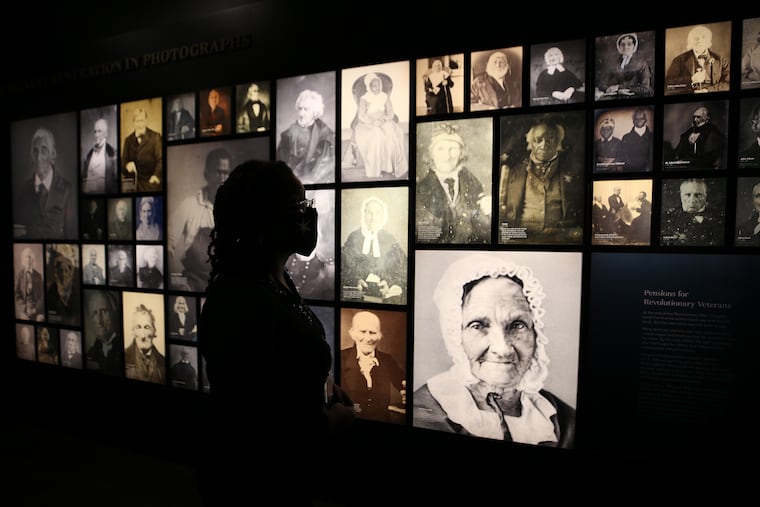In 1807, N.J. women and free people of color lost the right to vote. The Museum of the American Revolution explores why.
"When Women Lost the Vote: A Revolutionary Story" runs through April 25 and explores the complicated story of voting rights in N.J. during the decades following the Revolutionary War.

At the Museum of the American Revolution, a ballot box from Deptford Township in Gloucester County, N.J., sits enclosed in a glass case. The iron that reinforced the box’s wooden frame has rusted and one of the two plaques decorating the box is dated 1811.
Next to it, a weathered book from October 1801 is opened to display the names of people who voted in a Montgomery Township election in Somerset, N.J. Amid the dozens of Johns and Roberts and James that filled the ledger, names like Rebecca, Mary, Elizabeth, Deborah, and Catherine also appear, highlighting something uncommon for its time: Women could and did vote.
Prior to the museum’s discovery of seven New Jersey poll lists in 2018, little proof of women or people of color voting during this period was known to exist.
The ballot box and poll list are just two relics that are a part of the museum’s latest exhibition, When Women Lost the Vote: A Revolutionary Story, 1776 – 1807. The exhibit, which runs through April 25, explores the untold stories of women and free people of color who voted in New Jersey during the decades following the Revolutionary War — a right that was stripped away by the state in 1807.
When Women Lost the Vote coincides with the 100th anniversary of the ratification of the 19th Amendment, which prohibited state and federal governments from denying voting rights to American citizens on the basis of sex.
In September of 1773, Phillis Wheatley became the first African American (and second woman after Anne Bradstreet) to publish a book of poetry. One of the first signed copies of Poems on Various Subjects, Religious and Moral is featured in the exhibit.
“So when you think about the [white] people who felt like they were being enslaved by Britain,” said Adrienne Whaley, the museum’s director of education and community engagement, “they talked about wanting liberty, but who is that liberty for? Does it go for Phillis Wheatley?”
Often, ownership of property was one of the eligibility requirements for voting rights, and "during the revolutionary and colonial era, women, generally speaking, once they got married, lost any individual rights they had as women,” said Whaley. “They transfer from being their father’s property to being their husband’s property. … Any objects they may have owned before were now their husbands.”
Opponents to inclusive voting rights argued that many ineligible people had voted, including married women, enslaved people, non-residents, and people who did not meet the property requirement. Soon after, a New Jersey statute, also on display in the exhibit, stripped the vote away from “aliens, females, and persons of color, or negroes” in 1807. It also granted the vote to all white male resident taxpayers.
The exhibit is integrated into the museum’s core galleries, which is roughly divided into four sections, each unfurling a central question: How did people become revolutionaries? How did the revolution survive its darkest hour? How revolutionary was the war? What kind of nation did the Revolution create?
The museum decided to present When Women Lost the Vote as a part of its core gallery, “to grapple with the changes that the COVID-19 crisis had presented to us,” said Marcela Micucci, curatorial fellow in women’s history at the museum. The exhibition had been in the works since 2017 and was originally planned as a temporary exhibit in the Patriots Gallery. But coronavirus restrictions complicated the process. “I honestly think it came out stronger,” Micucci said.
More than 65 artifacts are featured in the exhibit, including the 1776 New Jersey State Constitution (which did not exclude residents from the vote based on race or sex), the wedding dress of Deborah Sampson who, before she married in 1785, disguised herself as a man to serve in George Washington’s army. To help build out narratives, the exhibit also makes use of digital interactives, immersive environments, and a free downloadable audio tour.
The museum has installed floor markers that encourage social distancing, and in the gallery, visitors are never far from a hand sanitizer dispenser. The museum is also operating at a limited capacity, only allowing up to 360 visitors per day. Masks are required. The exhibit is on view during the museum’s regular operating hours: Thursday through Sunday, 10 a.m. to 5 p.m.
Two original first-person theatrical performances are also being offered by the museum. The performances dramatize the different experiences and perspectives of two women of the period: Elizabeth “Mumbet” Freeman (played by Tiffany Bacon), an enslaved woman in Massachusetts who sued for her own freedom and won, and Rebecca Van Dyke (D’Arcy Dersham), who, along with her daughters, cast her vote in New Jersey. The performances have been recorded and will be presented as a film at the museum. Future live performances are being considered for holidays and special occasions.
While working on the piece, Philadelphia playwright Teresa Miller said she had a hard time figuring out Freeman’s personality. “I heard about [Mumbet] vaguely but I didn’t learn about her in school,” Miller said. “There were so many things that we had to sew together to make the play authentic and real.”
Miller describes When Women Lost the Vote as "surreal.”
“I’m not even going to sit up here and say I know how those women felt. I can’t say that. I wasn’t born then," Miller said. “But [the exhibit] is like having one-tenth of 1% of a glimpse of how it was.”